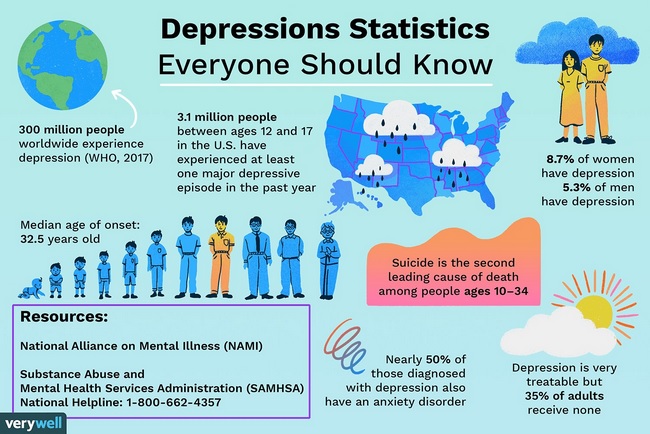What Does Mental Health Mean For TEFL Teachers? Know Now!

Research reveals that every 1 out of 8 people in the world suffer from a mental health condition.
Everyone is impacted by poor mental health, whether directly or indirectly. More efforts are being made to destigmatize mental illness, which for a very long time was disregarded, mocked, or ignored totally in a variety of fields and contexts. The most prevalent ones are anxiety and depression, with PTSD, bipolar disorder, and schizophrenia trailing closely after. Take a look at what TEFL and mental health might mean for ESL instructors.
Few Mental Illness And How Do They Affect TEFL Teachers
Even while it is impossible to discuss every facet of mental disease and every mental health issue that exists, here are some of the more prevalent ones.
1. Depression
The most prevalent mental ailment is depression, followed by anxiety disorders. There are several distinct types of depression, including postpartum depression, recurrent depressive disorder, depressive episodes, and clinical depression.

Source: teflcourse.in
This has an impact on education. Even the most upbeat, joyful instructor may have depressive symptoms. It's important to make an appointment with a local doctor if you have symptoms such as disengagement from the class or other students, insomnia, lack of interest in your job, or any other related issues.
Do you follow us on Social Media? If not, then you’re missing out on a lot of informative content. We regularly share upgraded educational content, tips, feedback, and more. Check us out by clicking the profiles here - Facebook / Twitter / LinkedIn / Pinterest / Instagram / YouTube
2. Anxiety
Though persistent stress might be a risk factor, anxiety is not only stress, making it one of the more misdiagnosed mental illnesses. a state of disquiet, such as concern or fear; mild anxiety is sometimes normal, like in the moments before a test or interview. However, things might become worse.
Anxiety symptoms might include acute fear, sweating, a sensation of dread, difficulty concentrating, and panic episodes (bursts of dizziness, palpitations, and an irregular pulse). Panic episodes are tough, as you may guess, and the fear of them can be self-fulfilling. Although it might seem like a worst-case situation to teachers, several interventions can be helpful.
3. Bipolar Disorder
Bipolar disease, once known as ‘manic depression,’ is characterized by both dizzying high and low moods, similar to those linked to more general despair. The signs of a ‘manic’ episode might include exhilaration, racing thoughts, impulsive behavior (which frequently involves making risky financial decisions), increased energy, and excessive talking.
A depressed episode typically presents as poor mood, loss of enjoyment, lack of interest in social and occupational activities, lack of energy, and other classic depression symptoms. Increased emotions of guilt and shame, particularly about actions during a manic phase, can also be a sign of a depressive episode.
4. Schizophrenia
Roughly 24 million people, or 1 in 300, suffer from schizophrenia, which is sometimes mistaken for multiple personality disorder. What's going on here are perceptual impairments and behavioral alterations, such as severe agitation, trouble with cognitive functioning, delusions, hallucinations, and disorganized thought patterns.
Effective therapies for schizophrenia include therapy, meditation, and early-stage psychoeducation, which teaches the patient, their family, and others around them how to recognize behaviors linked to the illness.
5. Post-Traumatic Stress Disorder
It's something that emerges following a terrifying incident, or sequence of incidents, and it can take many different forms. In addition to avoiding thoughts or activities connected to the incident, people with PTSD may have intrusive memories, nightmares, or flashbacks.
They may also have lingering sensations of danger or dread. For PTSD, psychological care more especially, therapy can be quite beneficial.
Tips For Looking After Your Mental Health
If you as an educator are struggling with mental health, here are a few strategies to try:
- Boundaries
You need to know what you are capable of and have reasonable expectations for yourselves. Although pushing oneself is vital, avoid doing so at the expense of your health. When you create goals for yourselves, it's important to remember what makes you feel good about yourselves. Also, while maintaining your boundaries make sure to set your working hours for maintaining a work-life balance.
- Talk To Your Loved Ones
Talking to someone may often help you sort through your ideas and make sense of them. Anyone you trust can do this, including parents, coworkers, and even pets. The most crucial thing is to express such emotions and healthily deal with them.
- Consult Therapy
Do not suffer in quiet if you feel that life is becoming too stressful; instead, talk to someone about it. There are many resources available to assist you, including expert listeners. Consult a therapist with qualifications and expertise for the best suggestions and results.
Protect Your Peace
Though discussing mental health is becoming more commonplace in certain places, it remains taboo in others, since society is continually evolving. As educators with a 120 hours International Certificate in TEFL, you have a lot of responsibilities and you shouldn't have to deal with common teaching stressors by yourself, such as marking, lesson preparation, or meeting the requirements of students with special needs.
We believe education should be accessible for everyone. That’s why we don’t charge for our blogs. Find the right course that will help you in your career with us, contact us at - 8000180858. You can mail us at act@asiancollegeofteachers.com.
Written By : Sanjana